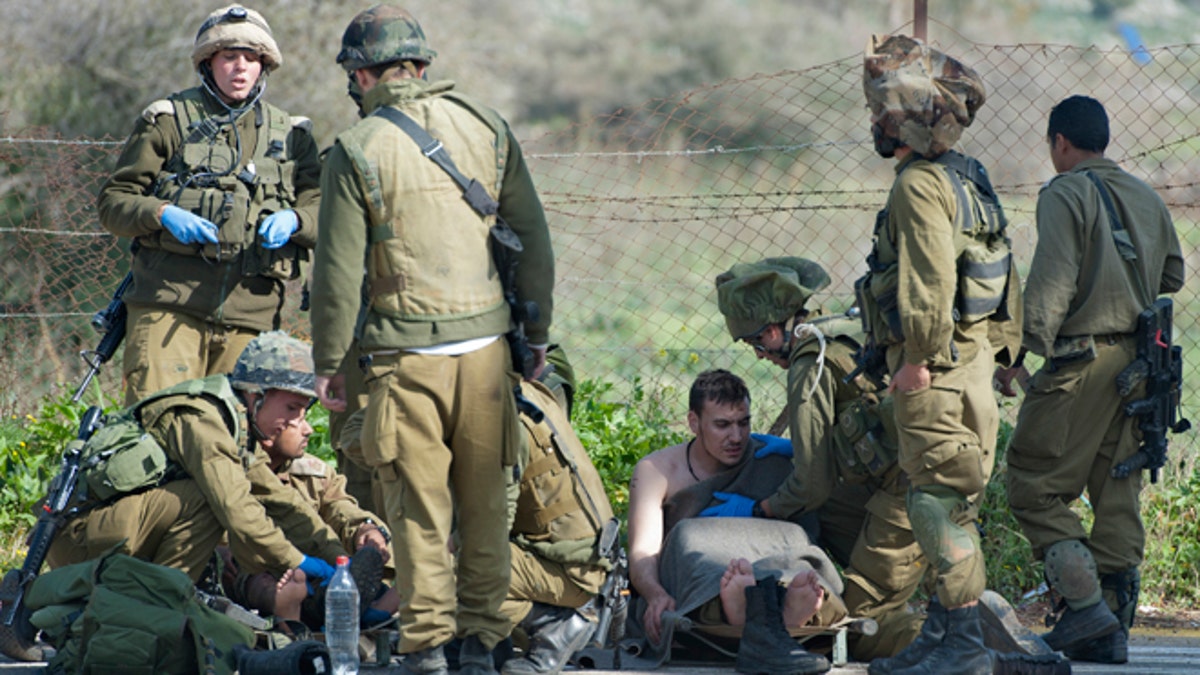
Jan. 28, 2015: Israeli soldiers treat a wounded soldier near the Israel-Lebanon border. A missile fired by the Lebanese Hezbollah group struck an Israeli military convoy on Wednesday, killing two soldiers in an apparent retaliation for a deadly airstrike attributed to Israel that killed many Hezbollah fighters in Syria earlier this month. The violence was the deadliest Hezbollah attack on Israel since a 2006 war between the two sides. (AP)
SHEAR YASHUV, Israel – Israeli Prime Minister Benjamin Netanyahu on Thursday said that Iran is to blame for a deadly flare-up along the Israeli-Lebanese border the previous day, the deadliest escalation in the disputed zone since the 2006 war between Hezbollah and Israel.
The violence erupted when the Lebanese militant Hezbollah group on Wednesday fired a salvo of anti-tank missiles at an Israeli military convoy in the disputed area, killing two soldiers and wounding seven. Israel responded to the missiles with shelling. A Spanish peacekeeper with the U.N. force in southern Lebanon was also killed.
The area was calm but tense on Thursday and village life appeared to return to normal. But Israeli forces were on high alert and the Lebanese National News Agency said Israeli warplanes were flying low over border villages.
"It is Iran that is responsible for yesterday's attack against us from Lebanon," Netanyahu said. "We will continue to defend ourselves against all threats, near and far alike."
Iran backs Hezbollah, which declared its attack an act of retaliation for an Israeli airstrike on Hezbollah fighters inside neighboring Syria earlier this month — an attack that killed six Hezbollah fighters and an Iranian general. Both Iran and Hezbollah are allies with Syrian President Bashar Assad in the civil war in the neighboring country.
"This is the same Iran that is now trying to achieve an agreement, via the major powers, that would leave it with the ability to develop nuclear weapons, and we strongly oppose this agreement," Netanyahu said referring to the negotiations over Tehran's nuclear program.
Though the violence sparked fears of yet another crippling war between the two foes — and an even further regional chaos — both Israel and Hezbollah seemed disinterested in escalating the situation further.
Israel goes to the polls in March and Netanyahu would not want to get involved in fighting so close to the election.
Shiite powerhouse Iran has been Assad's major backer throughout its bloody civil war, lending Damascus military support through its proxy Hezbollah group. If Hezbollah were to divert its forces from Syria to a war along the border with Israel, the Lebanese Shiite group could likely find itself stretched too thin.
The rhetoric indicated the situation could de-escalate further.
Israel's Defense Minister Moshe Yaalon said earlier Thursday that the military is on alert and is "ready for any development" while at the same time warning against further attacks.
Yaalon said Israel was informed by the U.N. that Hezbollah was unlikely to escalate the violence further. "We received a message through UNIFIL," Yaalon said, referring to the U.N. peacekeeping force in Lebanon, "that as far as they are concerned the incident is over."
Wednesday's violence was the worst in that area since the month-long 2006 Israel-Lebanon war. That conflict was sparked by a Hezbollah attack on an Israeli military vehicle along the border and the kidnapping and killing of two Israeli soldiers. The ensuing month-long fighting killed about 1,200 Lebanese and 160 Israelis and ravaged the Shiite-dominated region of south Lebanon as well as the country's infrastructure.
Spain's ambassador to the United Nations blamed Israel for the death of the Spaniard on Wednesday.
U.N. peacekeepers were seen in southern Lebanon on Thursday, inspecting damage at the Spanish contingent's base in Abbasiyeh village, where the soldier was killed.
